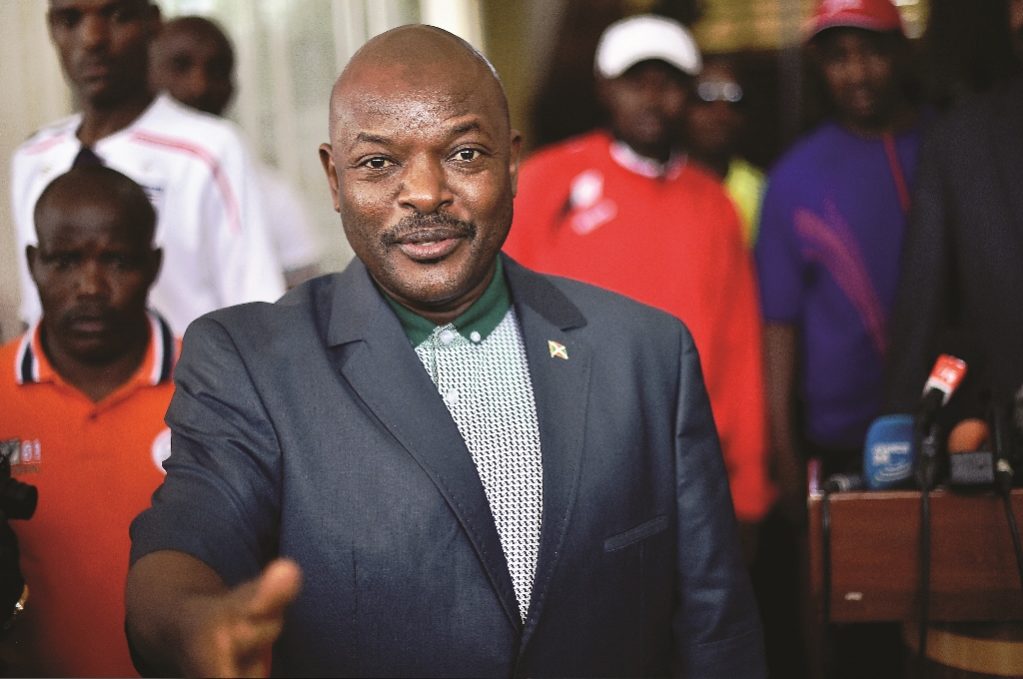The issue of term limits for presidents in Africa is a hot one fanned by unrest in Burundi.
South Africa’s President Jacob Zuma recently condemned leaders who tamper with their constitutions to stay in power. His comments could have been directed to Burundi’s Pierre Nkurunziza who lent on the Supreme Court to alter the constitution to extend his stay to three terms. Nkurunziza argues that the first term negotiated by a peace process doesn’t count.
“This business of us agreeing to serve two terms, only to realize 10 years is too short, is a problem,” Zuma is reported to have said in the aftermath of civil unrest in Burundi.
Constitutional law lecturer at Kent University in Britain, Alex Magaisa, says too many political elites violate their constitutions to stay in office.
“This is a dangerous trend in a number of African countries and we have just seen how this can lead to chaos and instability with the failed military coup in Burundi. This is why in Burundi’s neighbor, Rwanda, is of some concern over rumours that President [Paul] Kagame’s stay in office may be extended beyond the term limits. He has probably done a great job for Rwanda, but extending his stay in office will send a very bad message,” he says.
“The notion that a leader is indispensable is an indication of poor leadership because a leader must be able to nurture talent and promote potential successors.”
The Hong Kong-based political analyst, Obert Hodzi, says most of the African leaders wanting to rule for life usually prosper in countries with weak institutions.
“The reason is that all those countries, which include Uganda, Zimbabwe, Equatorial Guinea, Cameroon and Angola, are characterized by extractive political and economic institutions that only benefit the political elite and disenfranchise the majority of the countries’ citizens. For the leaders of those countries and their patronage networks to continue enriching themselves, they will need to monopolize political power and stay for as long as they possibly can,” he says.
The presidents of Chad, Gabon, Guinea, Namibia, Togo, Uganda and Algeria managed to change their constitutions to prolong their stay. Other countries’ presidents, such as Zambia’s Frederick Chiluba, Malawi’s Bakili Muluzi and Nigeria’s Olusegun Obasanjo, tried to change constitutions but failed to bend the people’s will. Zimbabwe did not have term limits until 2013; while Comoros, Algeria and Uganda remain without.
As the African Union (AU) met in South Africa, Ghana’s vice president, Kwesi Amissah-Arthur, urged the AU to debate term limits as it could be a solution to Africa’s life-time presidents. This could be tricky, especially when the chairperson of the continental body, Zimbabwe’s President Robert Mugabe, has been at the helm of his country for 35 years. In 2018, he is expected to seek a fresh mandate in Zimbabwe. If he wins, he will be 99 years old when his term expires and Zimbabwe’s leader for 43 years.
Life-time leaders threaten democracy. But leaders of troubled countries, like Rwanda, argue for them. Word is Kagame may seek a third term.
“It is irrational to change exemplary leadership [Paul Kagame] and more so in our context even in the name of constitutionalism,” Rwanda’s former finance minister, Manasseh Nshuti, is reported to have said.
The country’s opposition disagrees. The Democratic Green Party of Rwanda has filed a lawsuit demanding the Supreme Court block any move by parliament to change the constitution to allow Kagame a third term.
“The Democratic Green Party of Rwanda demands the Supreme Court… to order the Rwandan parliament not to change Article 101 of the constitution,” the party said in a statement.
In neighboring Burundi, around 40 people have died, 100,000 citizens fled to Tanzania, Rwanda and the Democratic Republic of Congo, over the issue of a term too far. Those fleeing violence are living at the Kagunga, Lake Tanganyika Stadium and Nyarugusu camps in Tanzania.
Burundians protesting against Nkurunziza’s bid for a third term are not alone. Late last year, Burkina Faso saw street protests that pushed out former leader Blaise Compaoré, who wanted to stay in power beyond the elections he won in 1991, 1998, 2005, and 2010.
But what about elections?
Yolande Bouka, a researcher in the conflict prevention and risk analysis division at the Institute for Security Studies (ISS) in Nairobi, told CNBC Africa that many governments in Africa create an environment where it becomes near impossible to hold free and fair elections.
“Having elections doesn’t mean that you have a democracy, and that is the impression that has been created. There needs to be more attention paid to the reasons for leaders changing the constitution,” says Bouka.
As the warring parties seem to drift further apart with each passing day in Burundi, many are looking to the AU for leadership to gently remind the continent’s presidents that their time is up.
